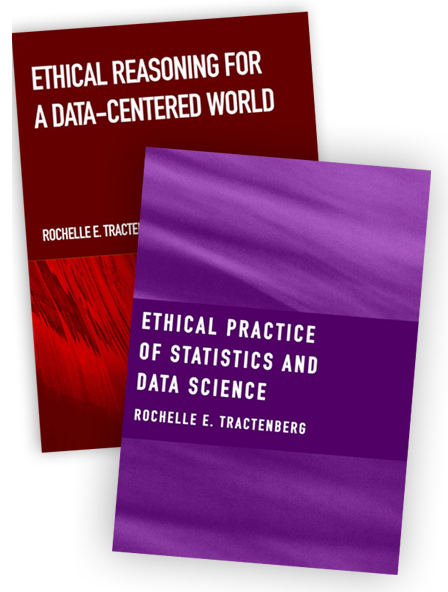
Ethical Reasoning
Foundational for Professionalism
Ethical challenges can arise in new and wholly unexpected situations throughout a career. It is not plausible to assume that scientists, and those who use science or its results at work, will somehow prepare themselves for specific unknowable eventualities. However, learning how to reason ethically … can serve to prepare anyone to identify, and appropriately respond to, currently-unknowable ethical challenges.
Rochelle Tractenberg
Why Ethical Reasoning?
Ethical reasoning enables instructors and learners to integrate ethics authentically into statistics and data science practice.
Google “ethics and statistics” (318 million) or “ethics and data science” (14 million) and you will find millions of results. The Institute of Electrical and Electronics Engineers (IEEE) published a 2012 description of the computer science undergraduate curriculum; the American Statistical Association (ASA) published 2014 guidelines on undergraduate statistics curricula and non-statistics majors’ statistics courses; and the National Academy of Sciences, Engineering, and Medicine published a 2018 report outlining curriculum features for the undergraduate major in data science. All these recommendations feature ethics. None discuss what it means, looks like, or should result in if a program or instructor does feature or teach ethics.
Books

Ethical reasoning enables instructors and learners to integrate “ethics” authentically into statistics and data science practice. I have completed two books written specifically to teach practitioners in statistics and data science how to reason ethically—with stakeholder analysis, professional practice standards, and other tools.
Got questions?
Feel free to reach out.
Featured Posts
-

Ethical Reasoning Is Content Independent
Professional ethical standards that can be leveraged to inform what constitutes ethical practice are not rules, but guidance. They require judgement and there must be training for that judgment to develop. Experience on the job does not suffice.
-

Why a Blog?
I wanted to create an accessible, community-focused forum for effective communication about what makes, or contributes to, “ethical practice of statistics and data science”.



